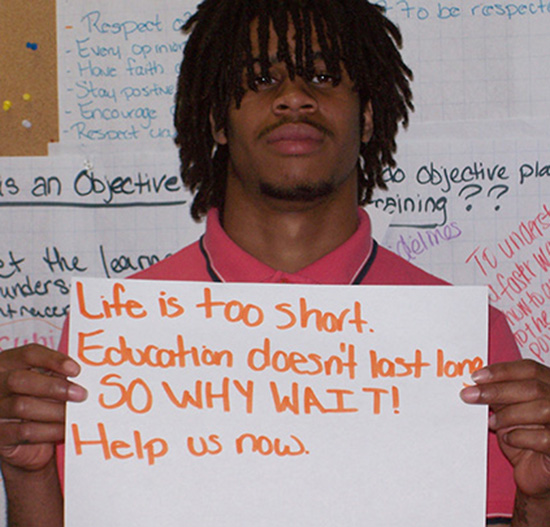
YWP works with youth with varying academic needs. They range from academic support with basic to rigorous AP classes, tutors, help applying to college, to health literacy. The homeless youth we work with need a place to do homework, have access to books, and use working computers. These are the problems we know how to solve – and should be solving more often in more schools. And then there are the ones we haven’t figured out yet like basic literacy. Many of the youth we work with have trouble writing a complete sentence, doing basic arithmetic, and even reading. Additionally, the lack of health literacy has drastic effects not only on educational outcomes, but also on wellness as children and adults, and life expectancy.
Youth are not engaged in their education. High truancy and chronic tardiness levels in our high schools demonstrates that students are not engaged. According to the Children’s Law Center and DC Lawyers for Youth, “half of high school students — 56 percent —were considered “chronically truant” during the 2013-2014.” A significant percentage of our high school aged youth miss school on a regular basis for many reasons– home responsibilities, weather, travel, and (most troubling) because they do not believe that the education they are getting will impact their success in life. The impact of the low student engagement is significant across the District and has deep implications for the way in which we select and apply educational interventions. I’ve included more data on these issues below:
Academic Performance: Across the district, 51 percent of students are proficient or advanced in math and 48 percent are proficient or advanced in reading. In 2013, DCPS was composed of 67 percent black/African American students. In 2014, 38.6 percent of black students were proficient in reading as compared to 91.6 percent of white students. In addition, 41 percent of black students were proficient in math compared to 92.3 percent of white students. The Statewide Longitudinal Education Data System (SLED) data reports that 48 percent of ward 6 students are proficient in reading, 31.4 percent of ward 7, and 23.8 percent of ward 8. In Math 49.5 percent in ward 6, 39.9 percent in ward 7, and 26.1 percent in ward 8 tested proficient.
College Enrollment and Graduation: Fifty-three percent of DC’s graduates have gone on to enroll in 4-year postsecondary institutions. Another 9 percent have enrolled in 2-year postsecondary institutions.


